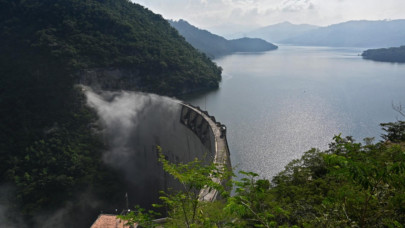The Răstolița hydroelectric plant on the Mureș River, long-stalled, was conceived in the final days of the Socialist Republic of Romania and approved in 1991, when environmental authorizations were just two pages long, few people understood the negative impact of hydroelectric dams, and EU membership was a distant dream for Romania.
Thirty years later, state-owned Hidroelectrica, Romania's largest hydroenergy producer, seeks permission to revive this project as part of efforts to accelerate the renewable energy transition. However, the project's massive social and environmental costs far outweigh the insignificant 35 MW of energy it would produce—energy that could be more efficiently sourced from lower-impact renewable alternatives, like a dozen wind turbines.
"We are at a crossroads in Romania: we can choose a path towards a positive and resilient future for nature, or resort to outdated 20th-century plans like the Răstolița dam, which will destroy more rivers and forests and make local communities more vulnerable," said Barbara Bendandi, Conservation Director at WWF-Romania. "Approving this zombie dam will benefit only Hidroelectrica, while future generations of Romanians will pay the price of increased water shortages and loss of nature. The government must not resurrect this dam."
The environmental authorization for Răstolița expired years ago, and Hidroelectrica is now awaiting government approval to resume development.
Alongside members of the Natura 2000 Coalition Federation, Bankwatch Romania, Declic, and 2Celsius, WWF is urging authorities to reject the project due to its risks. If approved, the project will:
Destroy 170 hectares of forest at the intersection of 3 Natura 2000 protected areas;
Fragment the biodiversity-rich Mureș River and severely impact 9 other rivers;
Negatively affect 43 protected natural areas and other protection zones supported by these rivers;
Negatively impact 2 Key Biodiversity Areas, important global sites for species and habitats;
This led to the local extinction of the huchen (Danube salmon), an emblematic and critically endangered species.
Beyond threatening various species populations, the degradation of these river and forest ecosystems will impact downstream water quantity and quality, with effects felt as far as Hungary, and undermine long-term resilience as Romania faces increasing climate change effects like extreme droughts and floods.
"This project makes no sense! Politically, economically, ecologically, and climatically, we live in a different world than 30 years ago: we must solve today's challenges with today's solutions, not with a destructive project from the communist era," said Stuart Orr, Global Freshwater Lead at WWF International. "It is time for Romania to invest in alternative solutions, such as low-impact solar and wind energy, and in protecting and restoring nature and rivers to increase resilience, rather than destroying them."
Ironically, the Romanian government is considering approving the dam just weeks after voting to approve the EU Nature Restoration Law, which sets a goal of restoring at least 25,000 km of rivers by 2030 by removing dams and other obstacles and emphasizes the importance of restoring healthy ecosystems to address the climate and nature crises. Additionally, less than two years ago, Romania signed the ambitious Kunming-Montreal Global Biodiversity Framework, which explicitly calls for protecting 30% of inland waters.
But the Răstolița dam would also violate several national laws prohibiting natural resource exploitation in Natura 2000 sites and deforestation in Călimani National Park, as well as EU directives on natural habitats, wildlife species, and water.
Moreover, the new environmental impact assessments are incomplete and superficial, leading to biased conclusions that do not consider the cumulative effects of the project's various components and do not fully address key issues related to ecological connectivity and protected species habitats.
"Romania can accelerate its renewable energy transition while respecting its commitments to halt nature loss and strengthen climate crisis adaptation," said Claire Baffert, Senior Policy Officer for Water and Climate Adaptation at the WWF European Policy Office. "The Răstolița project's compatibility should be properly verified against EU environmental legislation, particularly the Habitats Directive and the Water Framework Directive."
"Romania still retains many unique natural treasures, which are an important basis for sustainable rural development. Hydropower development directly threatens these prospects for many valleys in the Carpathian Mountains, as approximately half of all hydropower plants in Romania are located in Natura 2000 or other protected areas, destroying what should be protected," said Dr. Martin Pusch of the Leibniz Institute of Freshwater Ecology and Inland Fisheries (IGB) in Berlin. Together with several Romanian scientists, he has systematically analyzed the environmental impact and efficiency of Romania's hydropower plants.
Dr. Pusch added: "We have documented that, after the construction of hydropower plants in mountain rivers, trout populations often disappeared completely. The significant environmental impact of hydropower plants like the planned Răstolița one does not justify the gain of only about 0.05% in electricity. The energy transition to renewables is much more cost-effective with investments in the wind and solar energy sectors. This is why solar power production in Europe has tripled in the last ten years, and wind energy has doubled, while hydropower has seen no consistent growth."
Although authorities at various levels have claimed that the project is already in an advanced stage, as significant preparatory work was done years ago, producing the "first kilowatt" will still require massive investments, which will be borne by Romanian taxpayers. And the project's completion will, of course, result in enormous costs for people, nature, and resilience.
For all these reasons, the coalition is calling on the government to immediately and permanently ban the Răstolița hydroelectric dam and focus on replacing its potential energy with more sustainable investments in solar and wind power, or even by modernizing old hydropower plants.








